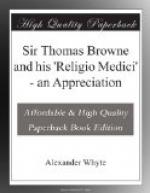I am naturally bashful, nor hath conversation, age, or travel, been able to effront or enharden me; yet I have one part of modesty which I have seldom discovered in another, that is, (to speak truly), I am not so much afraid of death, as ashamed thereof. It is the very disgrace and ignominy of our natures, that in a moment can so disfigure us, that our nearest friends, wife and children stand afraid and start at us. The birds and beasts of the field, that before in a natural fear obeyed us, forgetting all allegiance, begin to prey upon us. This very conceit hath in a tempest disposed and left me willing to be swallowed up in the abyss of waters; wherein I had perished unseen, unpitied, without wondering eyes, tears of pity, lectures of mortality, and none had said, Quantum mutatus ab illo! Not that I am ashamed of the anatomy of my parts, or can accuse nature for playing the bungler in any part of me, or my own vicious life for contracting any shameful disease upon me, whereby I might not call myself as wholesome a morsel for the worms as any.
ON HEAVEN
Now, the necessary mansions of our restored selves are those two contrary and incompatible places we call heaven and hell; to define them, or strictly to determine what and where these are, surpasseth my divinity. That elegant apostle which seemed to have a glimpse of heaven hath left but a negative description thereof: ’which neither eye hath seen, nor ear hath heard, nor can enter into the heart of man’: he was translated out of himself to behold it; but being returned into himself could not express it. St. John’s description by emeralds, chrysolites, and precious stones is too weak to express the material heaven we behold.




